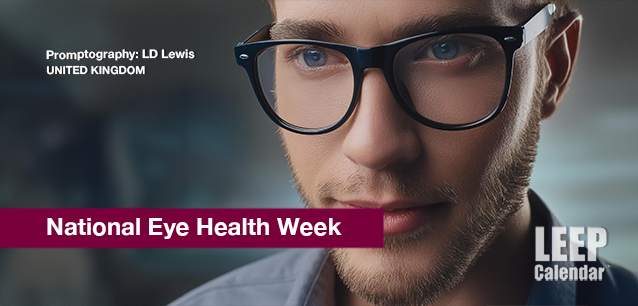 AD
AD
Today is: June 20
Scroll to explore events active on this date.
Additional Events on LEEP
LEEP INK FEATURES

May Blooms: Events in May 2025
Along with October, May is one of the most densely packed months of the year. It's before the summer humidity and the last whole month of the school year. The weather is warming in t...

Sweet June 2025
The solstice on the 20th marks the onset of summer (Northern Hemisphere) or winter (Southern Hemisphere). Many people, particularly in Europe, North America and Asia, will be embarking o...

Events in April 2025
Spring has sprung in the north, and the first hints of Autumn are on the horizon in the south. April is the month spring (or fall) gets underway, and it is filled with religious celebrations, including the Mu...
About National Eye Health Week in the United Kingdom
Seniors , Children
United Kingdom & Ireland
Ends: Sep 29, 2025
DESCRIPTION:
NATIONAL EYE HEALTH WEEK: PROMOTING VISION CARE IN THE THE UK
Each September, the United Kingdom observes National Eye Health Week, a dedicated effort to raise awareness about the importance of eye health and the impact of vision issues on individuals' lives. This week-long campaign organized by Eye Health UK aims to educate the public on maintaining good eye health and preventing vision loss through regular check-ups and healthy lifestyle choices.
The primary goal of National Eye Health Week is to highlight the significance of regular eye examinations and proactive eye care. The campaign seeks to inform the public about the causes of vision impairment, encourage preventive measures, and promote the benefits of early detection and treatment of eye conditions.
IMPACT OF SIGHT ISSUES ON YOUR LIFESTYLE
Vision problems can profoundly affect a person's life, influencing their physical, emotional, and social well-being. Key impacts include:
Reduced Quality of Life—Vision impairment can limit daily activities, such as reading, driving, and using electronic devices, reducing overall independence and quality of life.
Emotional Distress—Sight issues can lead to feelings of frustration, anxiety, and depression, mainly if they limit a person's ability to engage in previously enjoyed activities.
Increased Risk of Accidents—Poor vision can increase the risk of falls and other accidents, especially in older adults.
Social Isolation—Vision impairment can challenge social interactions, potentially leading to isolation and loneliness.
WARNING SIGNS OF VISION PROBLEMS
Recognizing the warning signs of vision issues is crucial for timely intervention. Common signs include:
Blurry Vision—Difficulty seeing objects clearly up close or at a distance.
Frequent Headaches—Persistent headaches, often caused by eye strain or uncorrected vision problems.
Difficulty Reading—Trouble focusing on text, requiring more light or magnification to read.
Squinting—Frequently squinting to see better, especially in bright light or when focusing on distant objects.
Eye Pain or Discomfort—Persistent eye pain, redness, or discomfort.
Double Vision—Seeing two images of a single object.
PROTECTING YOUR VISION
Individuals can take several steps to protect their vision and maintain good eye health:
Regular Eye Examinations: Schedule comprehensive eye exams with an optometrist or ophthalmologist at least every two years or more frequently if recommended.
Healthy Diet: Consume a balanced diet rich in vitamins and minerals, mainly those beneficial for eye health, such as vitamins A, C, E, and omega-3 fatty acids.
Protective Eyewear: Wear sunglasses with UV protection to shield eyes from harmful ultraviolet rays, and use protective eyewear during activities that pose a risk of eye injury.
Limit Screen Time: Reduce prolonged exposure to screens, take regular breaks using the 20-20-20 rule (every 20 minutes, look at something 20 feet away for 20 seconds), and ensure proper lighting to minimize eye strain.
Quit Smoking: Avoid smoking, as it increases the risk of developing age-related macular degeneration, cataracts, and other eye diseases.
National Eye Health Week underscores the importance of proactive eye care and regular check-ups in maintaining good vision and overall health. The campaign aims to empower individuals to take charge of their eye health and prevent vision impairment by raising awareness and providing valuable information. Through collective efforts and a commitment to eye care, the UK can ensure a future where everyone can enjoy a healthy vision.
VIDEOS
SUPPORTING DOCUMENTS
Currently, this event does not have supporting documents.
ADDITIONAL IMAGES
Currently, this event does not have supporting images.
Where would you like to go now?
 AD
AD


/footer-logo.svg)
